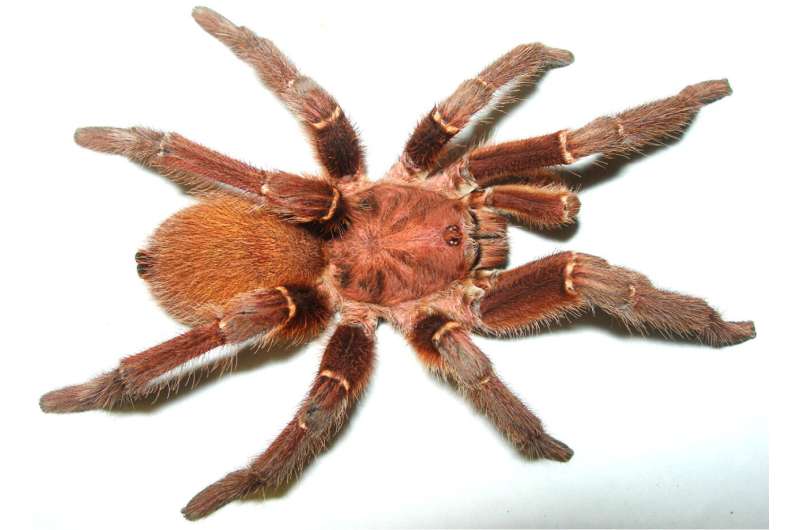A King Baboon spider (P. muticus). Credit: Volker Herzig.
A team of researchers from the Illawarra Health and Medical Research Institute, the University of Queensland's Institute for Molecular Bioscience and the Victor Chang Cardiac Research Institute, all in Australia, has uncovered the reason for the intense pain associated with king baboon spider venom. In their paper published in Proceedings of the National Academy of Sciences, the group describes a peptide in the venom involved in producing hyperexcitability in nerve cells.
The bite of the king baboon spider (which looks like a tarantula and lives primarily in Tanzania and Kenya) is not lethal, but it does produce a lot of pain in hapless victims. In this new effort to discover why, the researchers conducted a proteotranscriptomic analysis of the venom to identify possible peptides that they thought might be involved in producing pain. They identified one known as Pm1a (prior work has shown that it is typically involved in modulating dorsal root ganglion receptors in nerve cells.) They then synthesized the peptide to allow for NMR spectroscopy to ascertain its structure.
Next, they studied the impact of the peptide on mice by injecting a small amount into a toe. That allowed them to see that the peptide modulated ion channels and incited excitatory sodium currents. At the same time, it also reduced potassium currents that are typically involved in inhibiting excitatory currents. The end result was hyperexcitability in nerve cells, which, to the mouse, meant pain. To conclude their work, the researchers created a mathematical model of the peptide and its impact on nerve cells to further prove that it was the main driver of pain in victims of the spider's bite.
The researchers also note that the hyperexcitability they saw in the mouse nerve cells very much resembled the type of hyperexcitability seen in people who experience chronic pain. They suggest that a better understanding of how spider venom can produce similar results could perhaps lead to a way to reduce pain in these patients.
More information: Rocio K. Finol-Urdaneta et al, Multitarget nociceptor sensitization by a promiscuous peptide from the venom of the King Baboon spider, Proceedings of the National Academy of Sciences (2022). DOI: 10.1073/pnas.2110932119
Journal information: Proceedings of the National Academy of Sciences
© 2022 Science X Network























